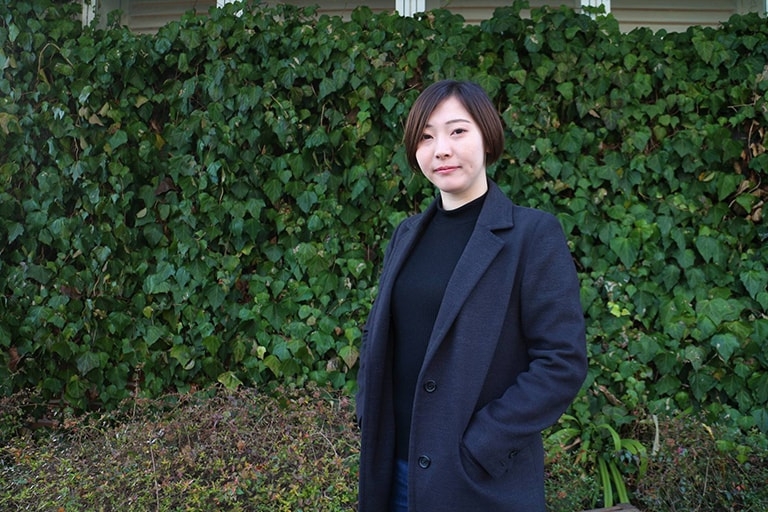4. What is the difference between being a nursing student versus a professional registered nurse? My only idea of what working in a hospital was like was through TV dramas, but the reality is quite a lot different from what I had expected. There are so many things nurses take care of behind the scenes. So every day is a learning process.
5. What are the challenges of being a nurse? I find myself helpless when a patient’s condition worsens due to the difference in ideas between the family and doctor. For elderly patients with brain damage, for example, some surgery may have significant risks. But we need to carry it out if the family hopes for it. Patients, however, can’t say anything, as they can’t speak.
6. How do you cope with those challenges, and what inspires you to work hard? When I see improvements in a patient’s condition I feel happy, and it motivates me to work hard. Also, patients’ smiles cheer me up.
7. What gives you a sense of achievement? The purpose of nursing is to help patients return to their everyday lives, so when patients successfully treat their disease or injury and are discharged from the hospital, I feel a sense of achievement.
8. Does your hospital accept coronavirus patients? There are no beds for COVID-19 patients. However, our hospital has a reception area for outpatients with fevers, so a number of patients have tested positive and were sent to other general hospitals which accept COVID-19 patients for treatment.
9. How has the coronavirus pandemic affected your work? It reinforced hygiene management, such as hand sanitizing, wearing face masks, aprons and goggles. Also, when colleagues show symptoms of fever, someone needs to cover their position until the result of their PCR test comes out. Working schedules become very tight in that case.
10. How do you manage your sleep schedule when you have a night shift? The night shift is for 16 hours and lasts from 4:30 p.m. to 9:30 a.m. When I expect to have a night shift, I normally start sleeping around lunch time and save energy.
11. What do you want to do after the pandemic? My hobby used to be going to live concerts and visiting Disneyland, so I would love to go when the situation allows.
12. Have you ever looked after patients who don’t speak Japanese? Yes. I remember one patient, probably from Senegal, was speaking in English, but we couldn’t understand each other. We eventually used machine translation on an iPad to try to communicate with him.
13. What do you think is the most important thing we can do to prevent COVID-19 and stay healthy? Although “staying home” is suggested, going outside and soaking in the sunlight is very important. Only staying at home may bring about negative thoughts and weaken your muscle strength, especially for elderly people. I recommend walking outside while keeping socially distant from others.
14. Is there anything you personally do as an infection prevention measure? I only go to a few places, such as my home, work and my partner’s place. I haven’t socialized these days apart from necessary appointments.
15. What are the main differences between getting the seasonal flu vaccine and the coronavirus vaccine? A vaccine for the seasonal flu in Japan is a subcutaneous injection, while the coronavirus vaccine is expected to be intramuscular. I would say the direction and the thickness of the needle are the main differences. The needle is injected between the skin and the muscle for subcutaneous injections, so the angle is shallow, but the needle is used vertically for muscular injections.
16. Have you ever given vaccine shots to patients? Is there anything you pay attention to? Yes, I have injected seasonal flu vaccines for a number of patients. Some patients are not used to needles and they seem to be afraid, so I make conversation with patients and try to create a relaxed atmosphere.
17. What are the three most important skills required to be a nurse? The ability to anticipate potential risks, interpersonal communication and also the ability to provide treatments to patients safely. Nursing is a job with a lot of responsibility, so you should be able to put your knowledge into practice.
18. What is your goal for the next few years? I’d like to be able to provide appropriate care to patients with any physical problems in any situation, even in an emergency on the street.
19. Is there a word you always keep in your mind for your work and life? I always keep reigi (manners/etiquette) in my mind. In other words, respecting everyone. If someone helps me, I appreciate that, and if I cause any trouble, I apologize. Those basic manners are important to me.
20. Do you have any advice for those who want to become a nurse? As long as you have a clear reason why you want to become a nurse, you can overcome any challenges you may face. My advice is to ask yourself why you want to be a nurse and if you have a clear idea, go for it.
